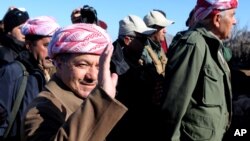Iraqi Kurdistan’s regional President Masoud Barzani has announced that the time has come for Kurdistan to hold a referendum to decide on declaring unilateral independence from Baghdad.
“The time is ripe for the people of Kurdistan to decide their future,” Barzani said in a statement released Tuesday.
He said while the result of the referendum would not lead to an immediate break with Baghdad, it would prepare the ground to declare an independent state “at an appropriate time and circumstance.”
Any move toward independence could be fraught with challenges: There are deep divisions among Kurdish political factions that support Barzani’s continued hold on the presidency and others who oppose him.
Economic pressures
Kurdistan is also suffering from a severe economic crunch, with many public salaries now months in arrears.
Baghdad cut funding to the region in 2014 after the Kurds, seeking economic independence, built an oil pipeline to Turkey and began exporting oil without Baghdad's approval.
Stephen Cook, senior fellow for Middle East Studies at the Council on Foreign Relations, says economic pressures could have played into Barzani’s decision.
“The Kurdistan Regional Government is in serious financial straits because of low oil prices and the perennial fighting with Baghdad over money,” Cook told VOA.
“This could be seen as an effort to extract money from the central government in Baghdad,” he said.
A KRG team on January 31 met with Iraqi government officials to discuss reforms aimed at resolving the economic crisis that both are facing, Reuters reported.
Iraqi Kurdish forces are seen as Washington’s strongest local partners in the fight against Islamic State extremists, although Kurdish Peshmerga are still heavily reliant on coalition forces' help to keep the militants at bay.
Putting U.S. on notice
Cook said Barzani may also have wanted “to put the Americans on notice that the Kurds are not going to ask for permission to establish an independent state.”
Because Barzani also enjoys a relatively positive relationship with Ankara, Cook said Turkish President Tayyip Erdogan could be prepared to work with an independent Kurdistan – while continuing to attack Syrian Kurds, who Ankara believes are linked to independence-seeking Kurds in Turkey.
Kurdistan is officially made up of three northern provinces, but during the fight against IS, Kurdish forces have spread beyond that to control areas that are disputed with Baghdad, such as parts of the oil-rich region of Kirkuk.
Iraqi Kurdish Leader: Time ‘Ripe’ for Independence Referendum
- By Sharon Behn





